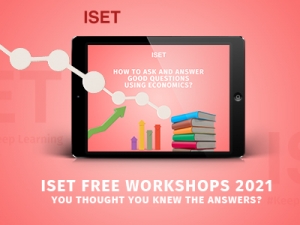ISET’s Muhammad Asali publishes latest research
We’re delighted to highlight two of Muhammad Asali upcoming economics papers. Professor Asali has once again proven his international credibility and emphaized the significance of his research in the field.
The first piece, Labor Market Flexibility and Exchange Rate Regimes, co-authored with Kuokstis and Spurga, is soon to be published in the European Journal of Political Economy. The work offers the first evidence about the causal relationship between labor market flexibility and the choice of exchange rate regimes. The analysis identifies that more flexible labor markets are expected to have a higher degree of exchange rate fixity; to adopt fixed (pegged) exchange rate regimes rather than floating exchange rate regimes, or more likely to become part of a currency union. The authors’ results ultimately confirm predictions of the optimum currency area theory.
In the second study, Civil rights experiments versus enrichment experiments in wage gap analysis, forthcoming in Applied Economics Letters, Muhammad addresses the “index number problem” in wage gap analyses. In essence, the wage gap measured is dependent on the assessment type, yet the choice of which method is essentially arbitrary. This paper, however, suggests that this choice should not be arbitrary. The measurement should in fact be consistent with policy aims – specifically the use of “enrichment experiments” within quantity measures, and the “civil rights experiment” measurement approach when considering quality measures.
For further details on each paper see:
https://authors.elsevier.com/c/1esyTe52OrYfU
https://www.tandfonline.com/eprint/SXF8SWDNJ8RFMSUHEQDU/full?target=10.1080/13504851.2022.2056124
Professor Muhammad Asali Contributes to Canadian Research Conference
Professor Asali has once again aided the field of economics by participating in the 55th Annual Conference of the Canadian Economics Association – this year’s conference was held online between 3-5 June, and hosted by the Simon Fraser University Economics Department. In his latest presentation, by using a general-to-specific approach of vector-autoregression estimation, Prof. Asali offered his cutting-edge research on Cooperative and Violent Cycles within geopolitical conflicts.
Prof. Asali received his Ph.D. in Economics from Columbia University back in 2008 and soon after joined ISET’s resident faculty. Muhammad moreover has extensive teaching experience from Columbia University, New York University, and Union College. His research and teaching interests include Labor Economics, Applied Microeconomics, Econometrics, and Time Series Econometrics.
Prof. Asali will soon also present his research on exchange rates and the labor market during the upcoming Armenian Economics Association meetings at the end of June. Watch out for our next update for more information!
Free Workshop Series by ISET's International Faculty
How to Ask and Answer Good Questions Using Economics?
You thought you knew the answers
ISET – International School of Economics at TSU (ISET) is pleased to offer a unique training opportunity in economics for evolving professionals - four practical workshops in four different economic topics, free of charge. The workshops will be delivered online, in English by ISET’s senior faculty members, PhD Economists of the top western universities.
Who can apply: 4th year university students and evolving professionals holding BA or higher degree in any field.
ISET faculty member chairs the international conference
Our latest news comes from ISET resident lecturer and researcher, Professor Muhammad Asali. Recently, Professor Asali joined a group of prominent economists from around the world and took part in the 140th annual conference of the Western Economic Association International (WEAI). The conference platform is available here: WEAI online).
On the 19th of March, Muhammad took the role of chair in a review and discussion on various facets of Uncertainty and Risk. He was joined by peers from the economics world, including the authors of related papers, from the University of Wisconsin, the University of Maryland, and Koç University in Istanbul.
CONTACT US
16, Zandukeli St,
0108 Tbilisi,
Georgia
Telephone: (+995 32) 250 71 77
Email: info@iset.ge





